*NURSING > DISCUSSION POST > NR554: Nurse Leader in Healthcare Policy - Well Elaborated and Documented, Download To Score An A Gr (All)
NR554: Nurse Leader in Healthcare Policy - Well Elaborated and Documented, Download To Score An A Grade
Document Content and Description Below
Week 5: Leader Responsibility to Influence and Inform Healthcare Policy Discuss the main task of leaders’ responsibility related to influencing and informing healthcare policy issues and how you ... will apply these tasks within your current role and/or expected role after graduation. Nurses are the front-line caregivers in our health system, [which] gives them a unique and invaluable perspective on patient care," Dr. Hassmiller said. "They see firsthand the gaps in the healthcare system and the consequences of those gaps. They see where improvements are needed to increase access, promote prevention, coordinate care, and improve the quality and efficiency of healthcare." It is important for nursing leaders to remember that political decisions and social policy initiatives have an impact on nursing practice. Nursing leaders need to attain a place at the table where policy decisions are made to have a say in the policies that govern nursing. Nursing leaders who understand policy development are well equipped to influence decision-making about professional practice issues in their workplaces and to contribute to the development of health and nursing policy. Leaders in healthcare policy should learn how policy is developed and seek out areas of policy they want to influence. Their influence in healthcare policies protects patient safety, increases the quality of care, facilitates their access to required resources, and promotes quality health care. Nurse leaders involved in the policy process need to develop creative approaches to connect the concept of practice to policy (Mund, 2012). Creative approaches may include utilizing several different avenues to get involved. Membership and involvement in professional organizations and coalitions is an excellent source of involvement. Membership in these organizations provides nurses and nurse leaders with a voice when healthcare issues are being discussed and changes are proposed at all levels in healthcare policy. Nurses also should serve actively on advisory committees, commissions, and boards where policy decisions are made to advance health systems to improve patient care. Nursing leaders must build new partnerships with other clinicians, elected officials, the public, and individuals not involved in healthcare to help realize these improvements. Another avenue for leaders in healthcare policy to become involved in nursing research. According to Hinshaw & Grady, “results of well-designed studies to provide the foundation for evidence-based practice and policies” (2009). There are opportunities for healthcare policy leaders to become involved in research studies that influence organizational, health, and social policies. With their knowledge and hands-on experience, nurses can theorize, hypothesize, structure studies, and collect evidence that leads to better care. For nurse researchers to achieve parity with other health services, they must develop the skills and initiative to take leadership roles in research. While still in my current role as a bedside nurse I would like to join the local chapter of the National Alliance of Mental Illness to ensure that the voice of patients suffering from mental distress is consistently heard at every level and that their concerns, needs, and feedback (positive and negative) are consistently attended to. As an effective leader influencing healthcare policy, I will continually emphasize that safe, high quality, compassionate care is the top priority. As a master’s prepared nurse my leadership skills qualify me to influence and facilitate change in my workplace. I can serve as an advocate to change and improve the policies and procedures that affect patient care as well as nursing practice. As an MSN graduate, I have the ability to see where improvements are needed to improve the quality and efficiency of patient care. Thus, I can serve as a catalyst to implement new policies based on research and evidence-based practice. Reference Hinshaw, A. S. & Grady, P. A. (Eds.). (2009). Shaping health policy through nursing research. New York, NY: Springer Publishing. Mund, A. R. (2012). Policy, Practice, and Education. AANA Journal, 80(6), 423-426. Thomas, T. W., Seifert, P. C., & Joyner, J. C. (2016). Registered Nurses Leading Innovative Changes. Online Journal Of Issues In Nursing, 21(3), 9. doi:10.3912/OJIN.Vol21No03Man03 PROFESSOR RESPONSE TO POST: Indeed Carole! You can do so much. My vision for all graduates of our track is for you to be recognized by your community as the expert in the field you choose. I want you to be seen as a knowledgeable, reliable, and passionate advocate who is there for the long haul. Who will you advocate for? What are their needs that you want to champion? How will you move their agenda forward? RESPONSE TO PROFESSOR: Dr. Fildes, The National Institute of Mental Health (NIMH) estimates that 17.9% of adults in the United States experience mental illness in a given year. The health of the brain, as the center of all the body’s functions, should be treated with equal, if not greater, care as physical health. However, mental illnesses are less scientifically conclusive, less precisely explainable, more complicated, and less predictable than most mental illnesses. This has led to public perceptions surround mental illness based largely on stigma rather than fact. I believe the approach to mental health should also be awareness-based. Therefore, I propose efforts to refocus social awareness campaigns, create mental health treatment outreach initiatives, retarget approaches to youth mental health education, and the presence of child psychologists at public schools to both provide initial treatment for students who experience mental illnesses and to act as a liaison between students, guardians, teachers, and external mental health resources. Advocacy work for mental health awareness can be strengthened considerably through the use of partnerships. Working in coalition with others is the best way to demonstrate support for my policy priority and move my agenda forward. This will reduce duplication of efforts and resources and assists in individual and organizational networking. Joining forces with a coalition that consist of a diverse range of people and organizations can strengthen the mental health awareness campaign by broadening perspective and understanding of the issue. It can also assist outreach by appealing to a wider population base with differing priorities and interests. Thus, if I were to connect with a coalition that shares the same interest and purpose, I can achieve more widespread reach within my community. Furthermore, coalitions enhance the credibility and influence of an advocacy campaign. Finally, I should seek out respected policymakers in key positions who can act as loyal partner in my campaign. To understand their concerns and needs I should meet with them regularly and agree on how best to work together and share information. Carole B. RESPONSE TO STUDENT: Not all nurses are accustomed to being a strong presence in policymaking. Throughout history, nurses have been making policy changes. Lillian Ward, for example, advocated for disadvantaged groups and is seen as the one that promoted the first school nurse role (Schub, 2016). Penny, I currently work as a bedside nurse, but like you I would like to work in quality improvement. This past week my departmental Clinical Nurse Specialist, who’s also my mentor, recommended I apply for the departments nursing professional development specialist (NPDS) or better known as a nurse educator. An NPDS plans, implements, and evaluates nursing orientation as well as ongoing, professional development of nurses. This position could give me the opportunity to assist in departmental quality initiatives. The demand for quality improvement in hospitals is ever increasing due to federal government mandates, as well as local requirements, accreditation or regulatory boards, hospital organizations, medical societies, non-profit organizations, and health insurance plans. Thus, all levels of nurses, from the direct care bedside nurse to the chief nursing officer (CNO), play a part in promoting QI within the healthcare provider organization. A hospital organizational cultures set the stage for quality improvement and nurses’ roles in those activities. Hospitals with supportive leadership, individual accountability, physician and nurse champions, and effective feedback offer greater promise for successful staff engagement in improvement activities. Carole B. [Show More]
Last updated: 1 year ago
Preview 1 out of 6 pages
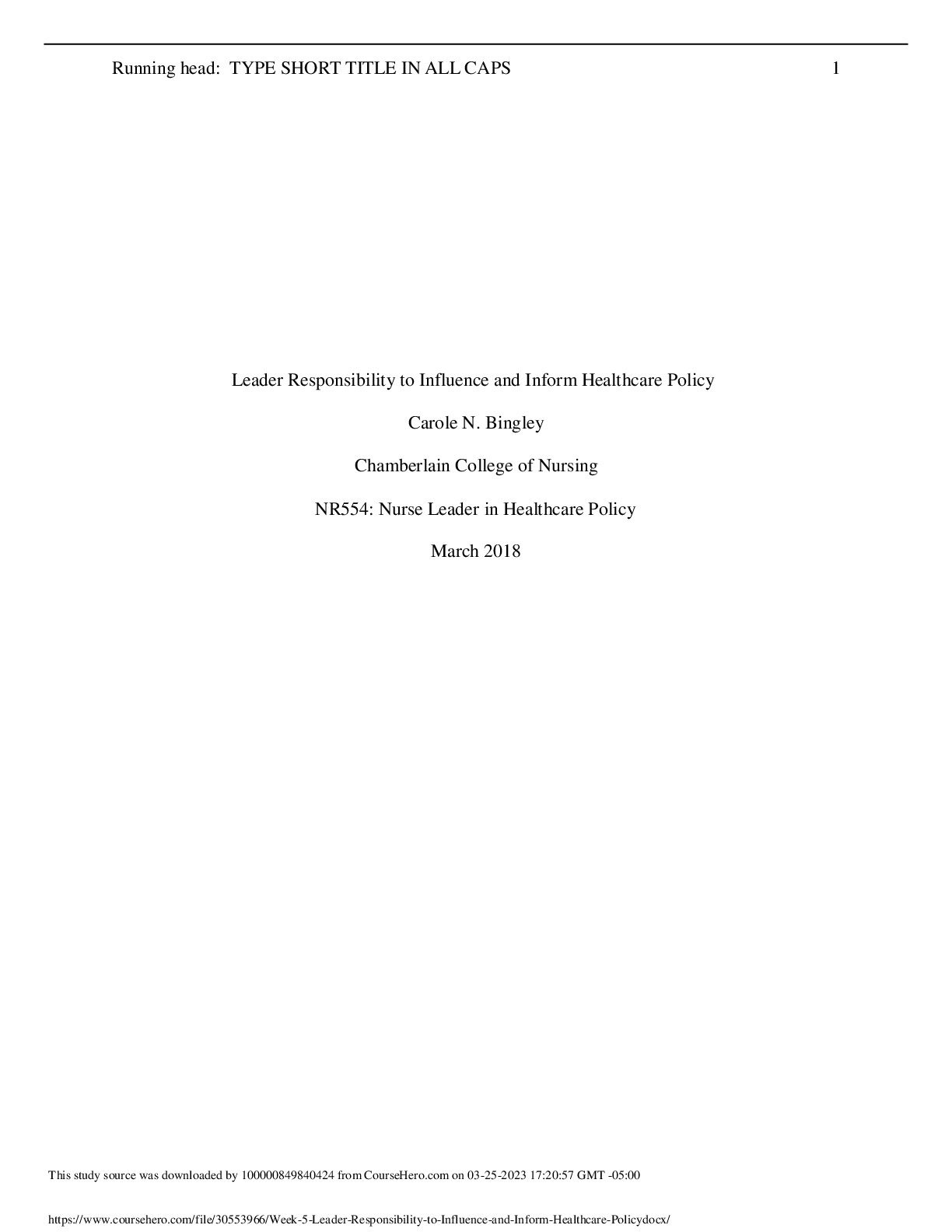
Reviews( 0 )
Document information
Connected school, study & course
About the document
Uploaded On
Mar 26, 2023
Number of pages
6
Written in
Additional information
This document has been written for:
Uploaded
Mar 26, 2023
Downloads
0
Views
63


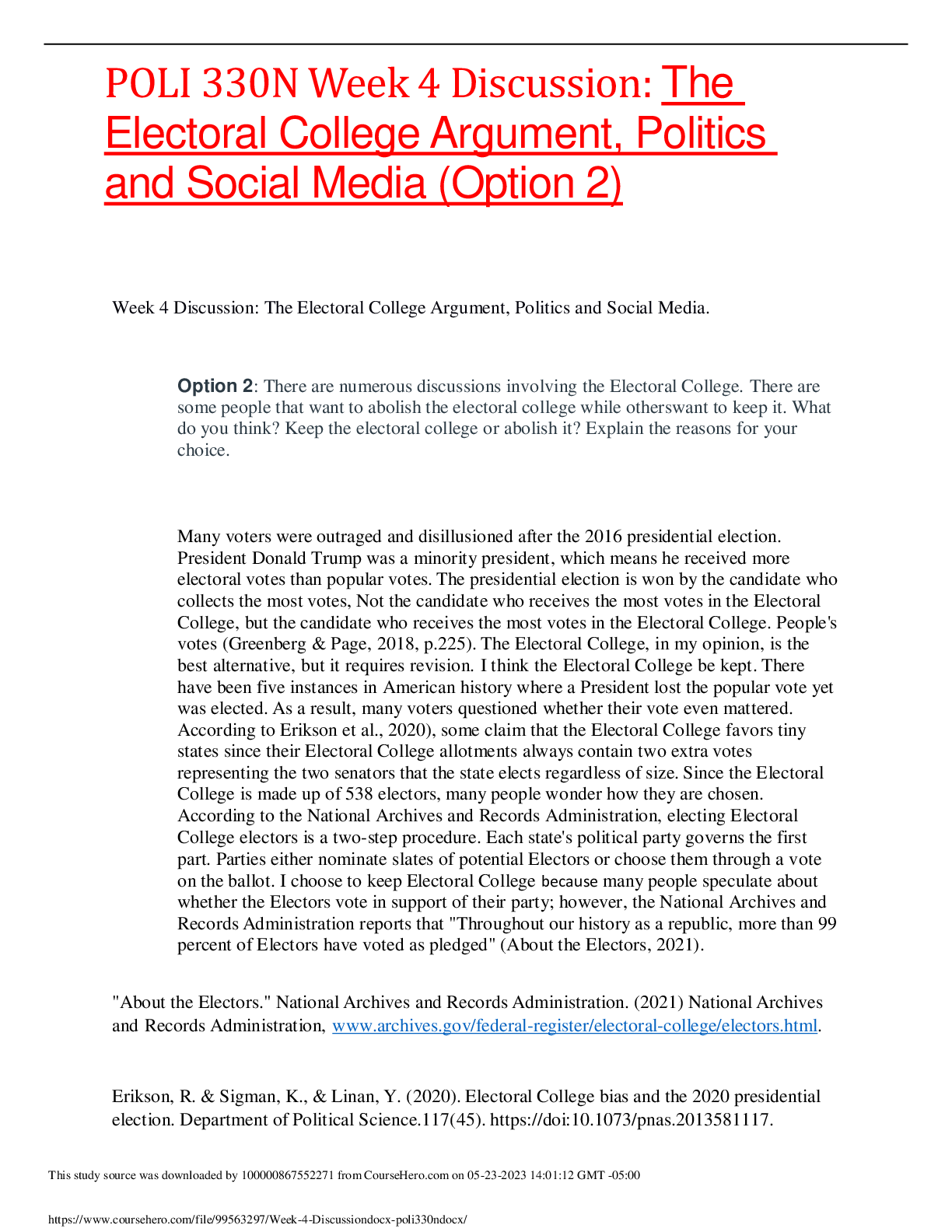
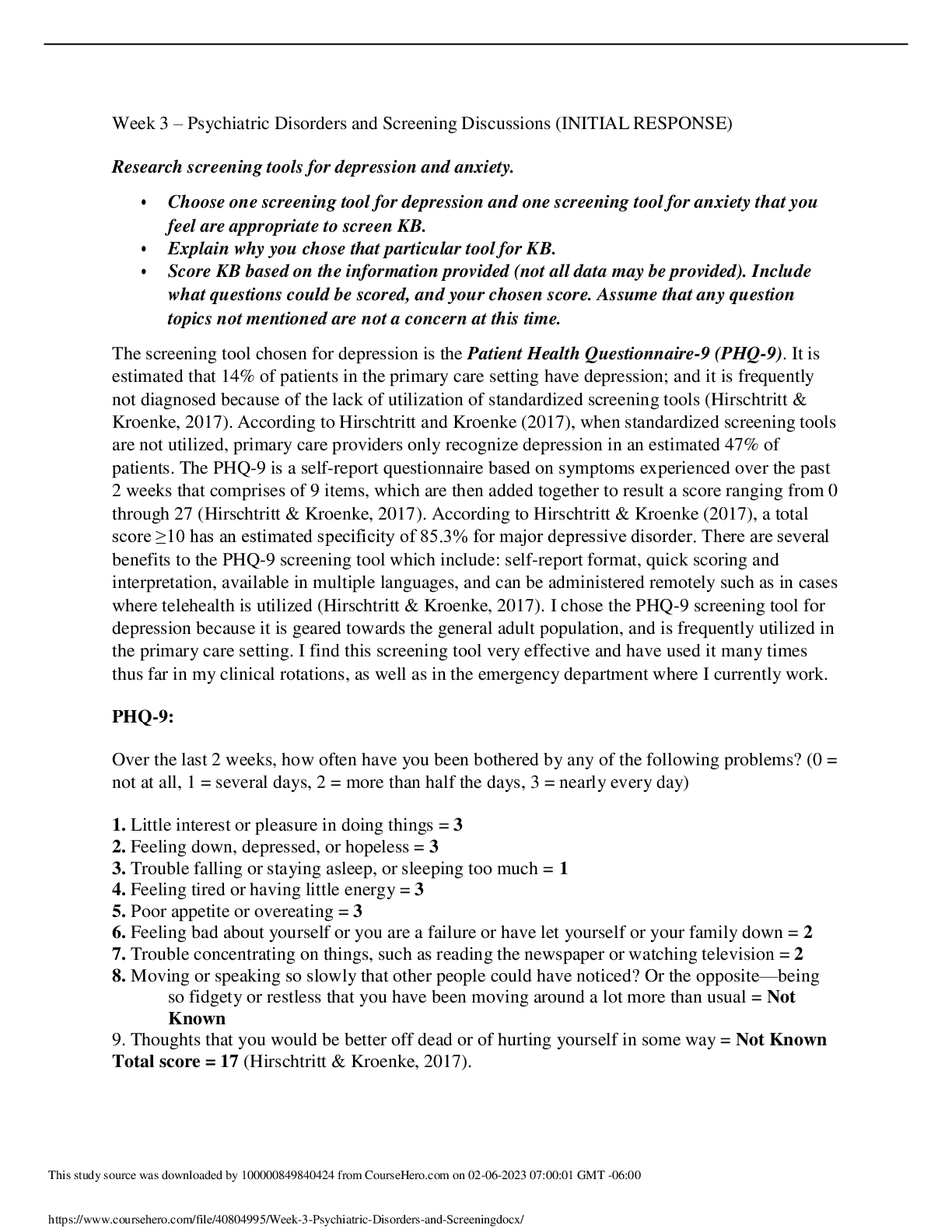
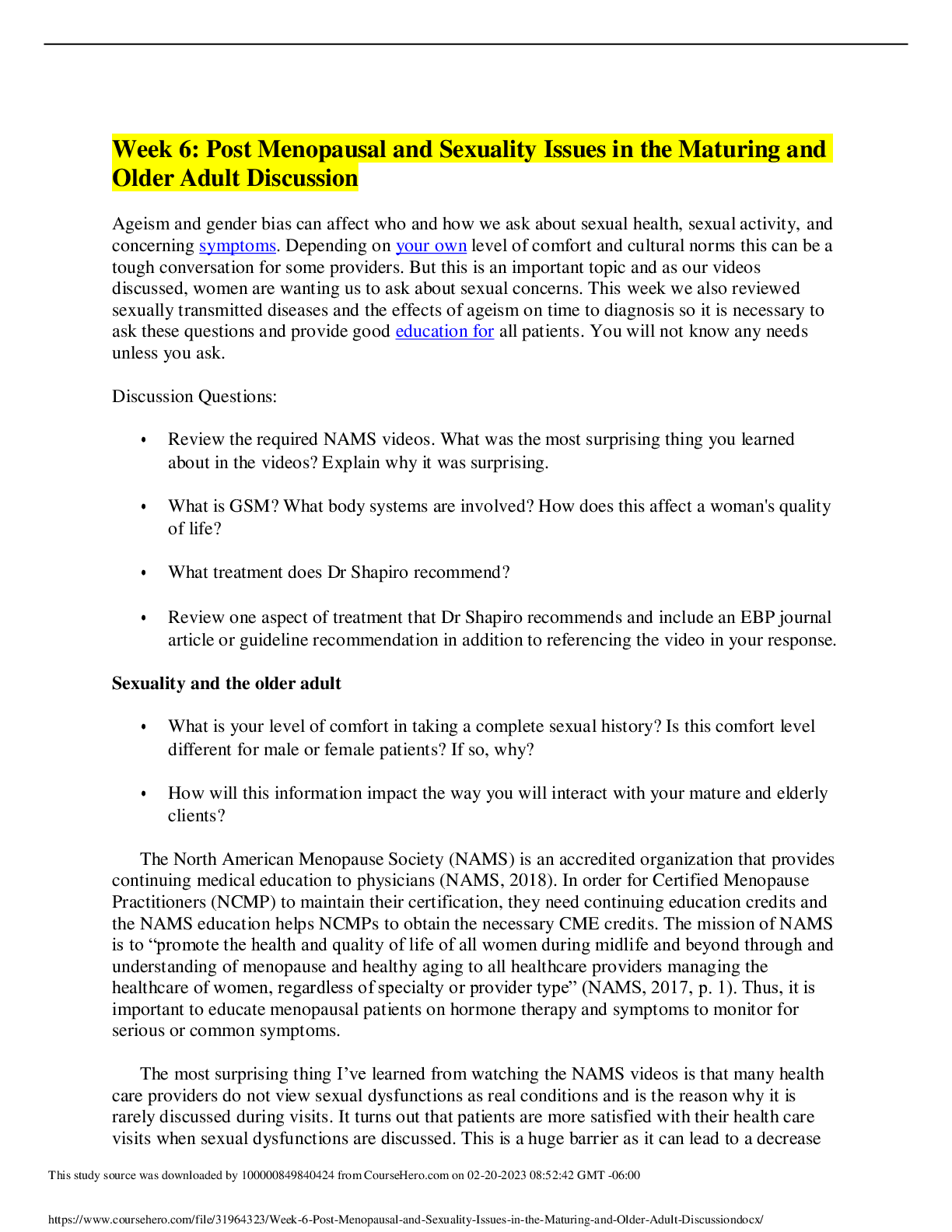

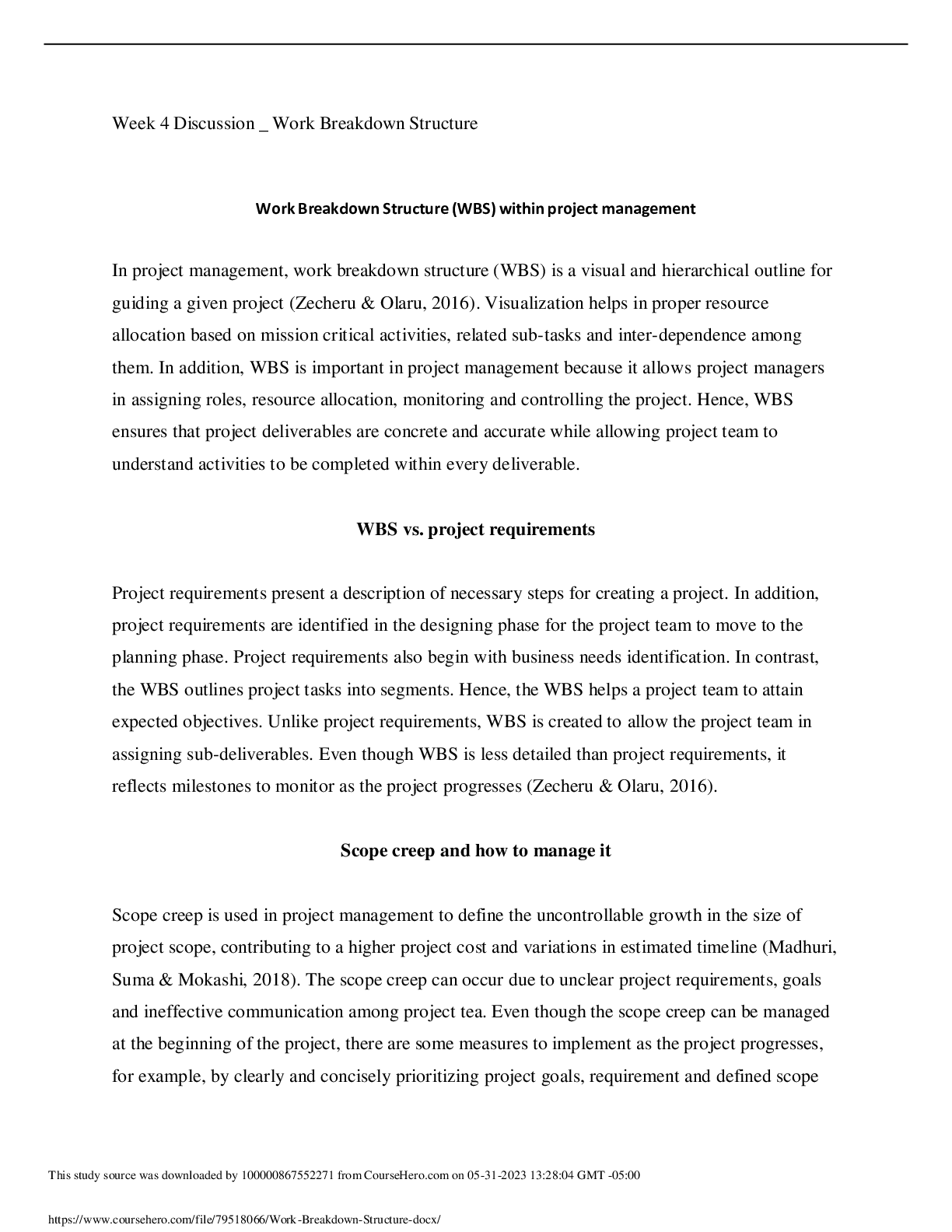


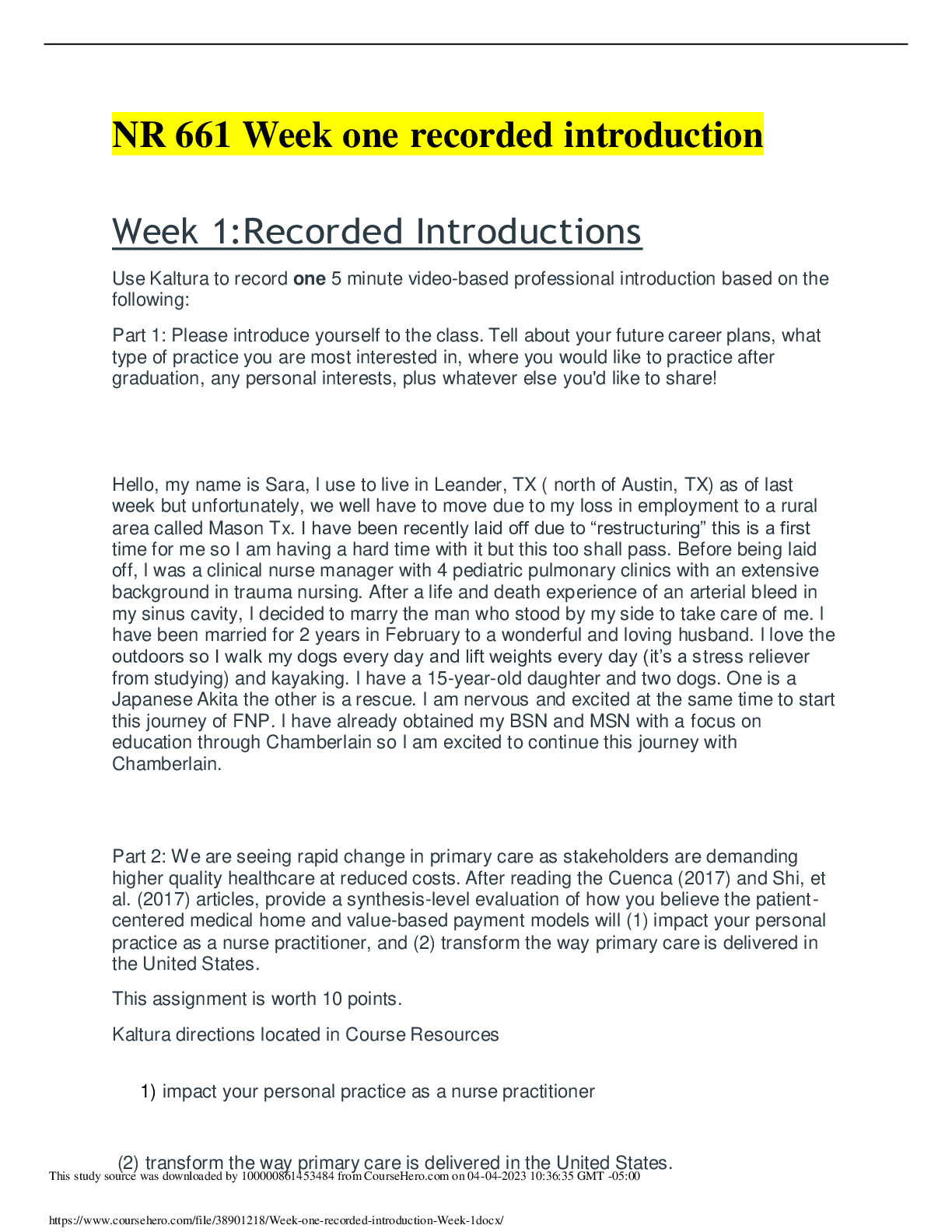

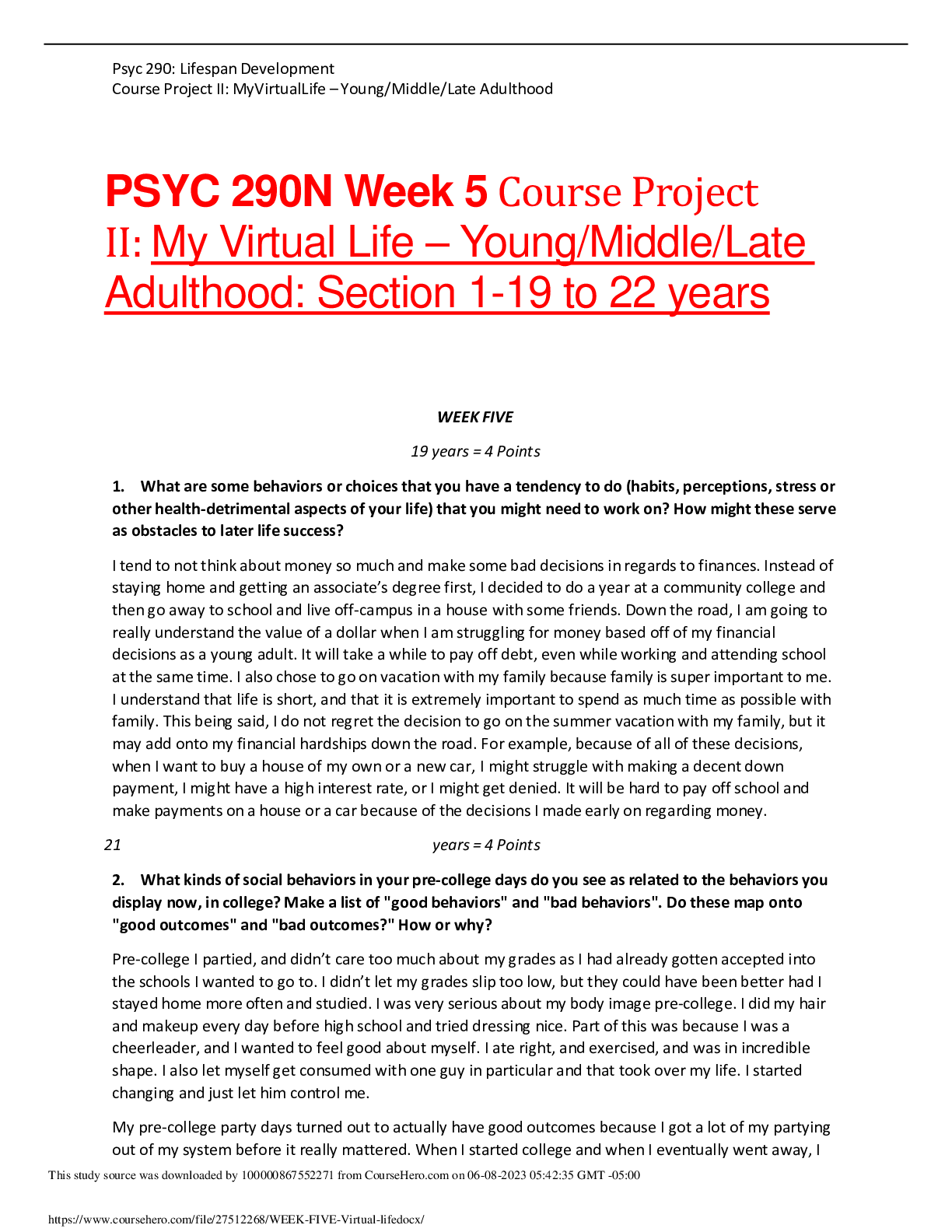





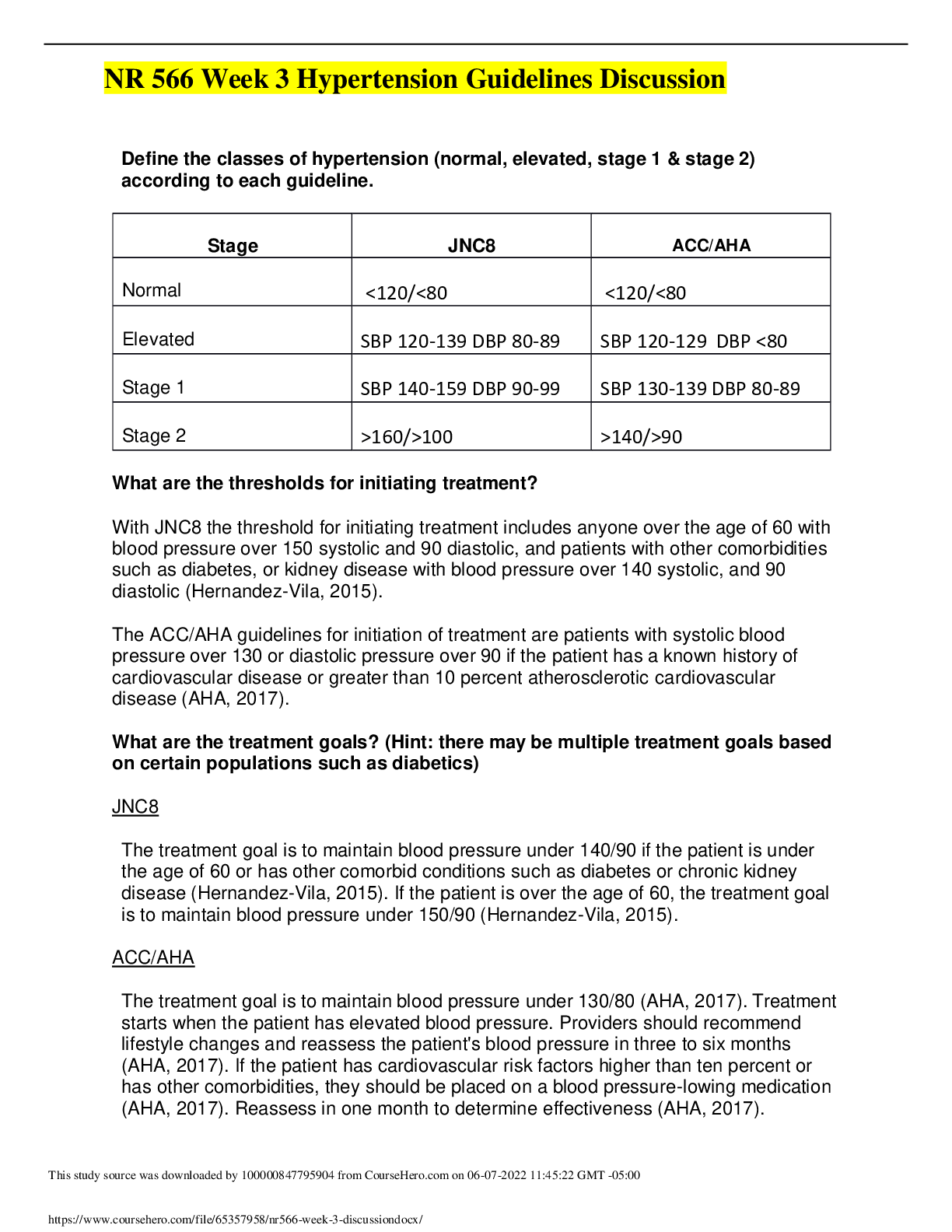
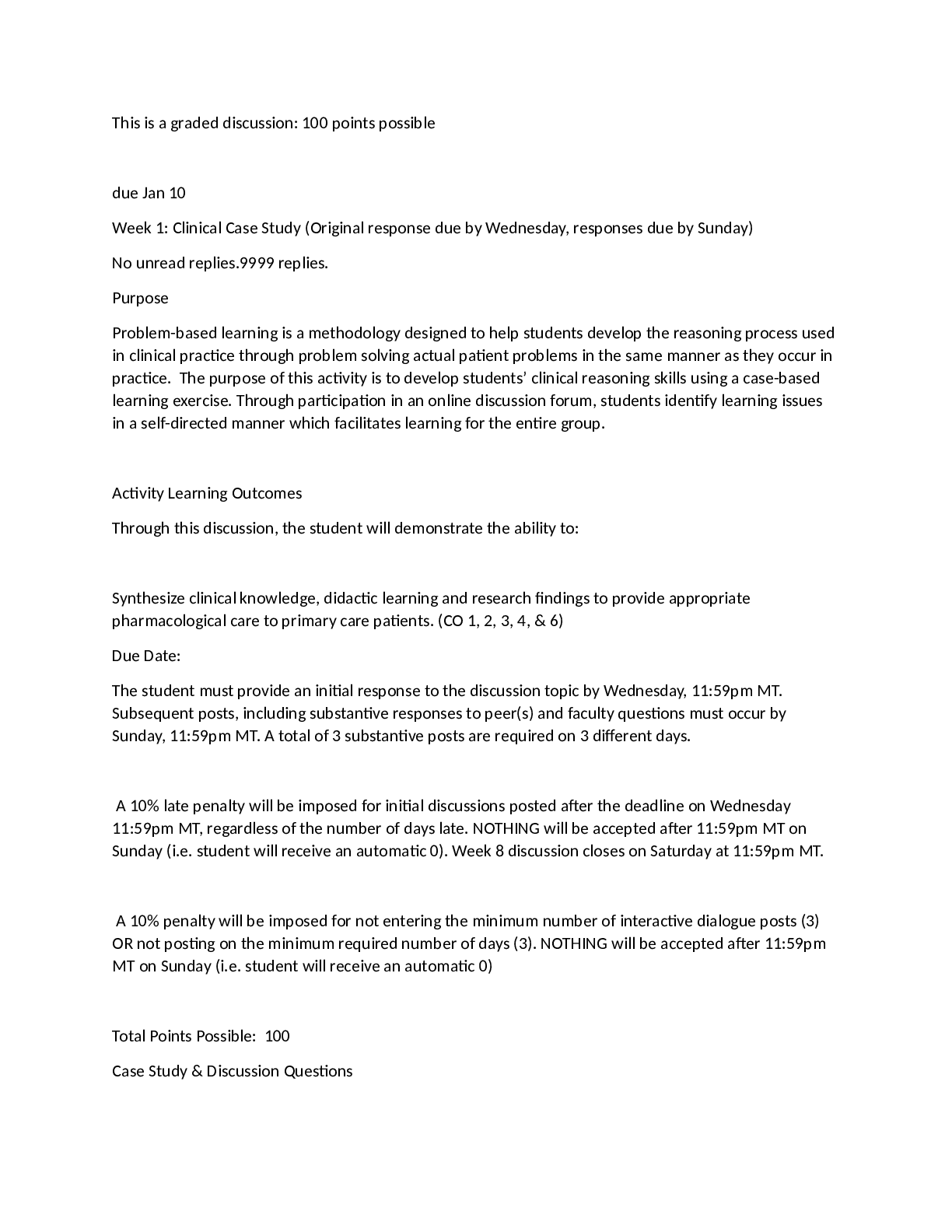
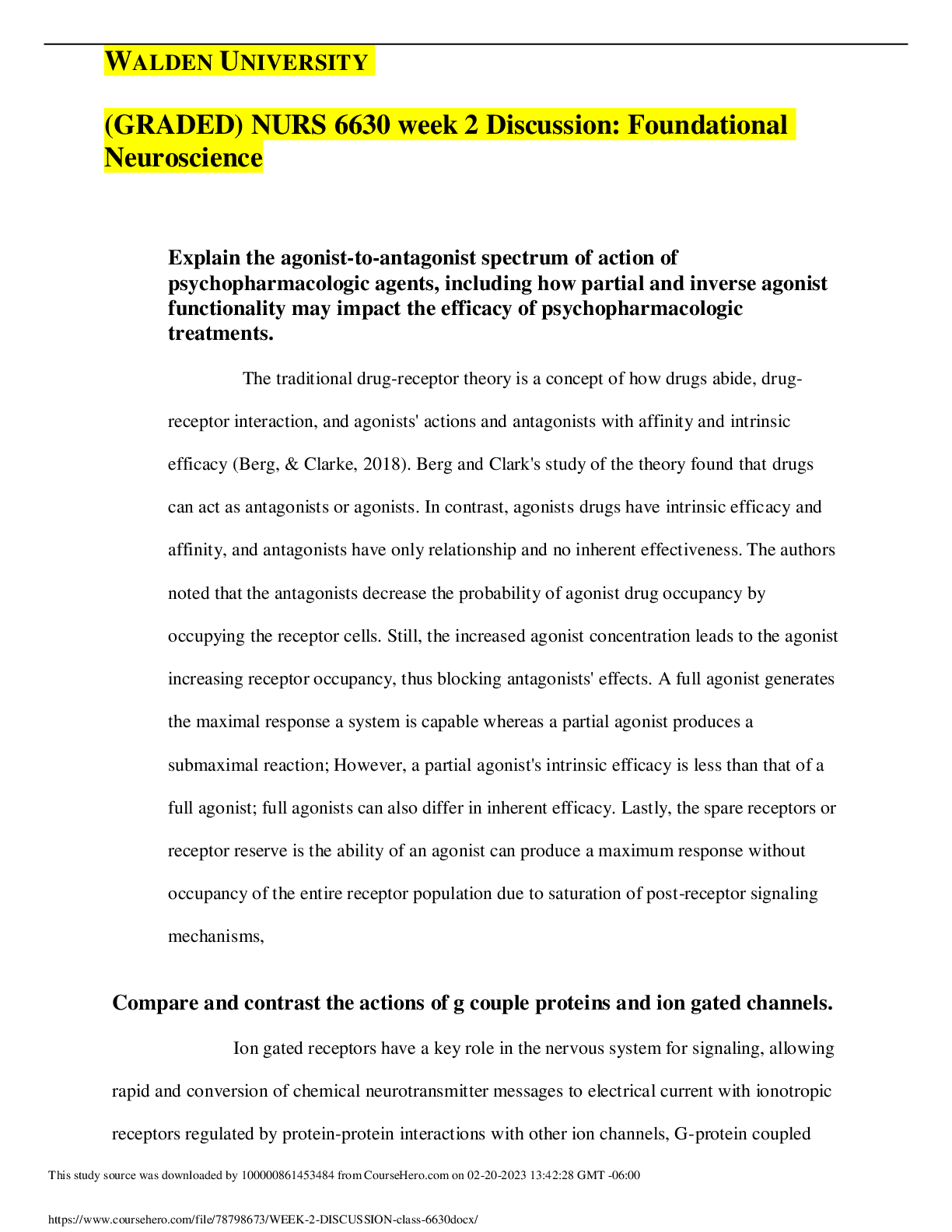
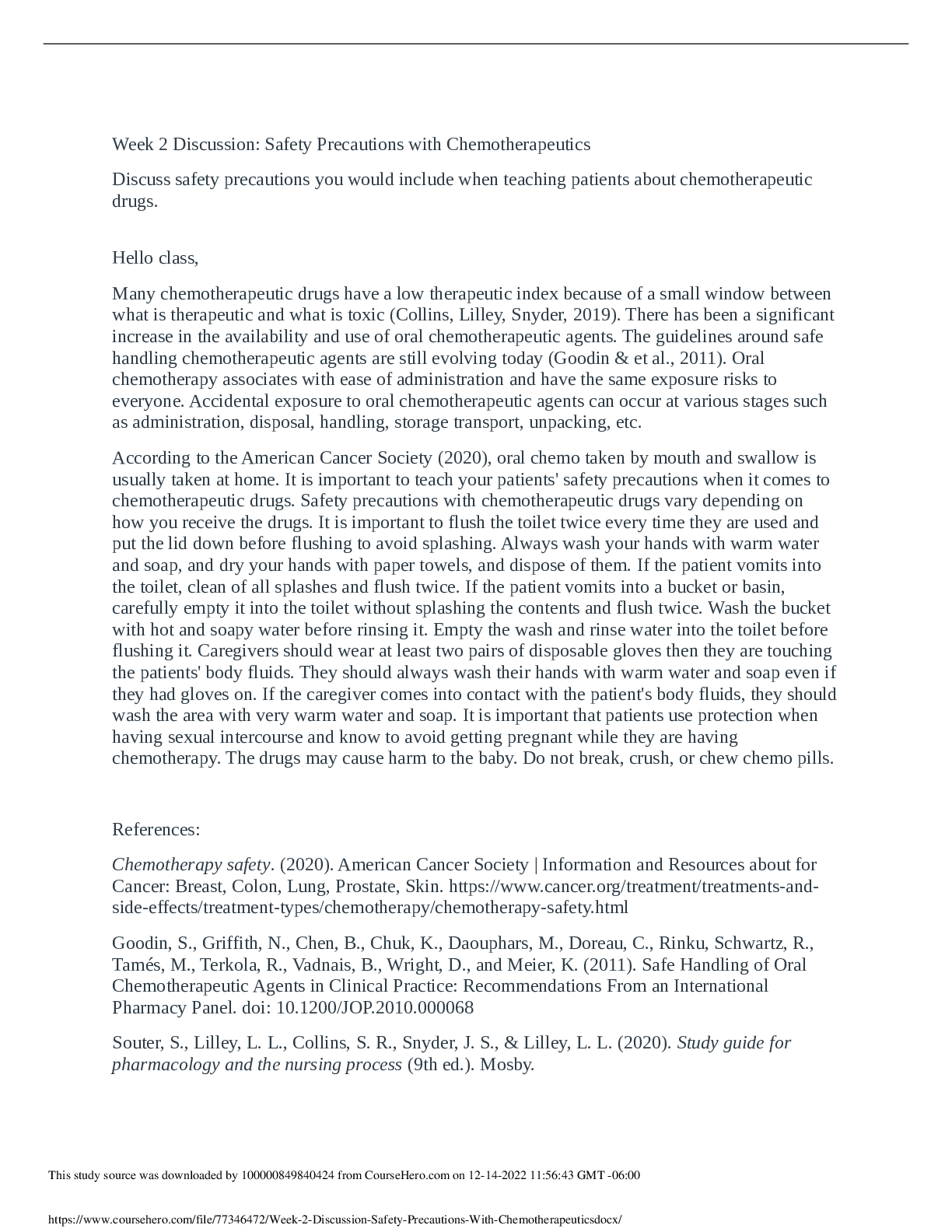



 (1).png)
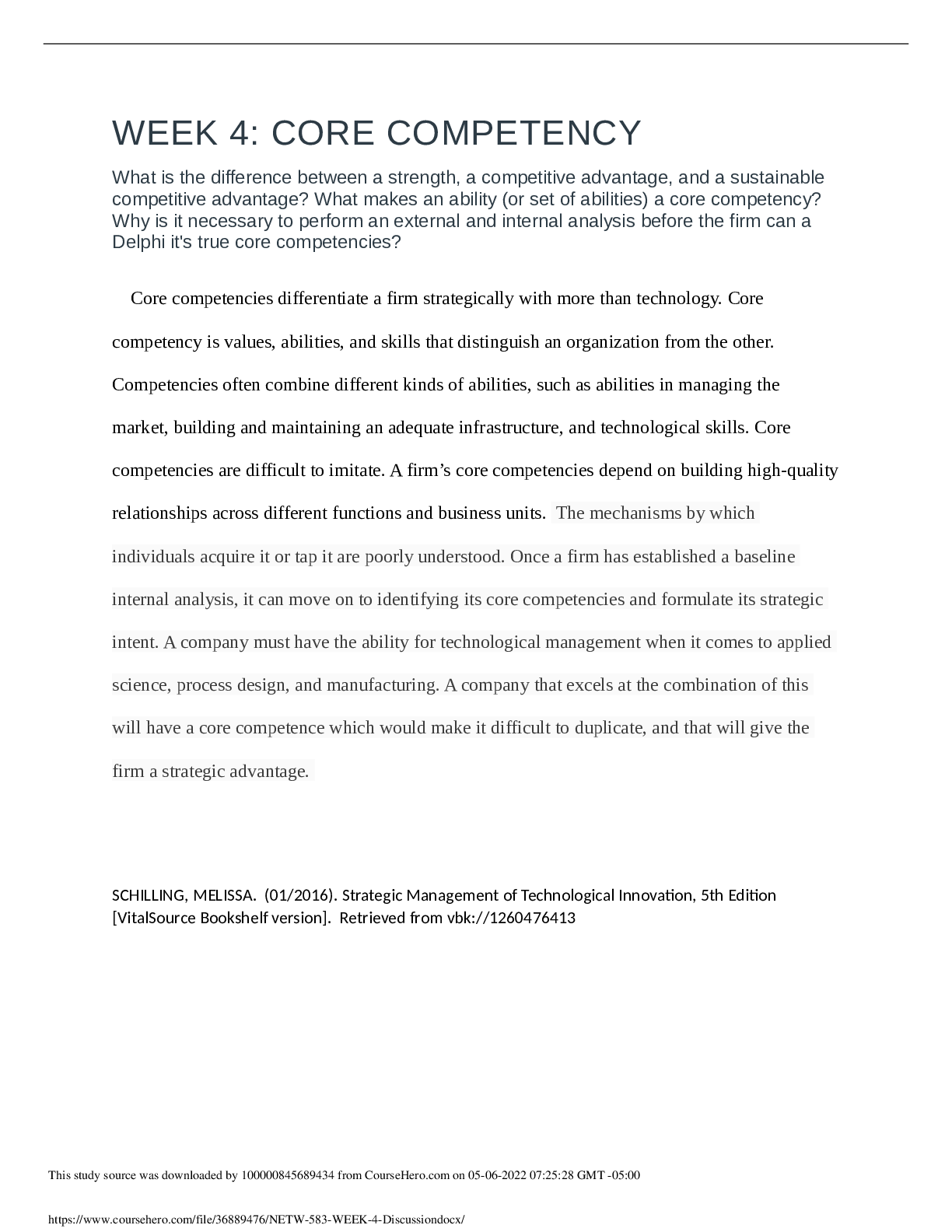




.png)
.png)
.png)

.png)


